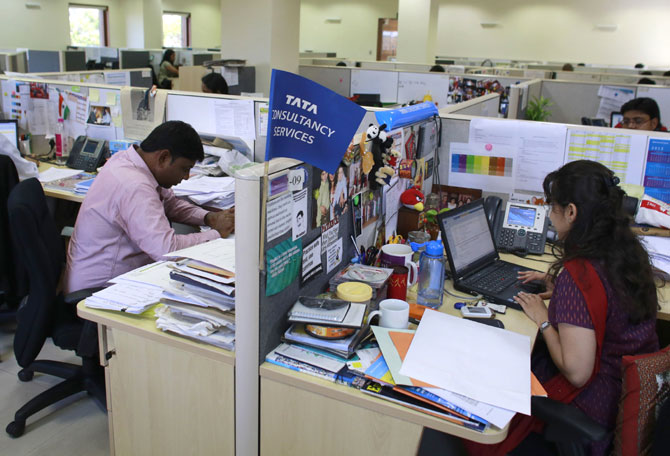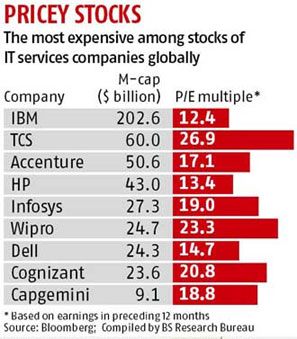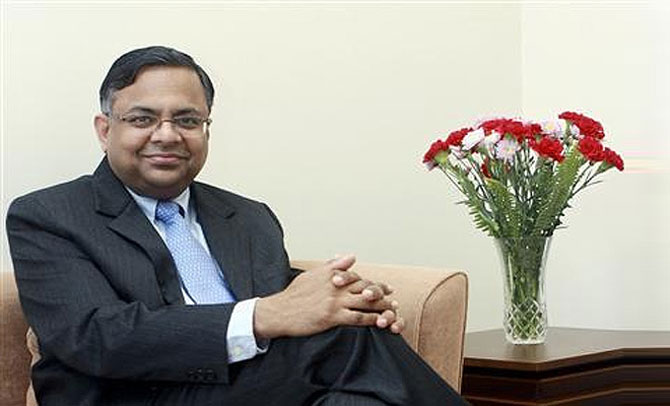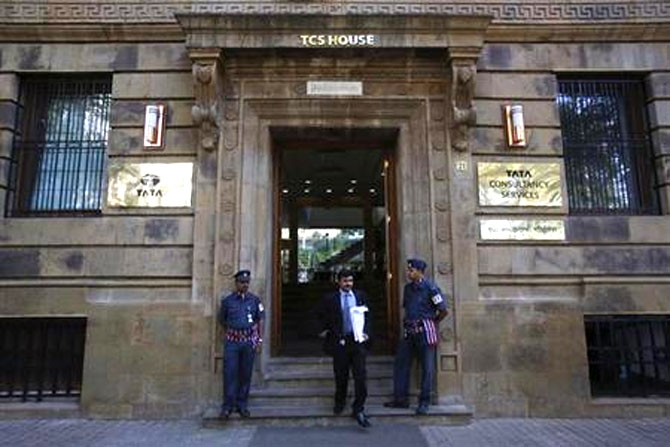
With a market cap of $60 billion, exceeds Accenture and HP but trails IBM
After t he recent rally in its stock price, Tata Consultancy Services (TCS) is now the world’s second-most-valuable IT services company — ahead of Accenture and Hewlett-Packard but behind IBM.
he recent rally in its stock price, Tata Consultancy Services (TCS) is now the world’s second-most-valuable IT services company — ahead of Accenture and Hewlett-Packard but behind IBM.
The Indian firm is currently valued at around $60 billion, compared with Accenture’s $50.5 billion and HP’s $43 billion. IBM remains the leader, with a market capitalisation of $202.6 billion as at the end of Monday’s trading (see table).
TCS, which accounted for nearly 47 per cent of the IT industry’s combined market cap and nearly four-fifths of the total net profit of listed IT companies on the BSE-500 index last financial year, is miles ahead of its Indian peers.
Five years ago, the company accounted for 28 per cent of the total market capitalisation of the IT industry.
Click on NEXT for more...

Analysts attribute this to TCS’ superior valuation on the bourses. “Investors are willing to pay a premium for TCS, as it has consistently been among the fastest-growing firms in the sector.
Besides, it has been able to maintain its profitability ratios despite macroeconomic challenges,” says Shashi Bhushan, senior research analyst (institutional equities), Prabhudas Lilladher.
These factors seem to have made TCS one of the most expensive technology companies in the world at present, with its market valuation much higher than its revenue and profitability.
The company has traded at around 27 times its net profits over the past 12 months. In comparison, Accenture, TCS’ closest global rival, trades at around 17 times its latest earnings per share, while IBM trades at 12.4 times.
Click on NEXT for more...

In the past three years, TCS’ revenues have seen a compound annual growth rate (CAGR) of 28.4 per cent, while its profits have grown at 26 per cent during the period. In comparison, both Accenture (nine per cent) and IBM (three per cent) have grown in single digits.
A higher valuation doesn’t directly benefit the company but experts say it has indirect benefits, such as a bigger global profile and greater attention from large global institutional investors looking for bigger and safer companies for long-term investments.
“This will help TCS attract top-notch global investors and provide stability to the stock in times of volatility,” Indirectly, this may improve TCS’ profile among its target clientele of the world’s leading companies and business leaders and help it grow faster.
Click on NEXT for more...

Analysts expect TCS to maintain the growth momentum and close the gap with its bigger global rivals.
“TCS is one of the fastest-growing IT services companies globally and we expect it to maintain the current growth momentum,” says Angel Broking Research Analyst Ankita Somani, who has a buy rating on the stock.
She attributes TCS’ success to its execution capability and its wide presence in key geographies.
“The company was one the first to recognise the importance of having a global footprint and it scaled up its geographical presence quite rapidly. It is now reaping the benefits,” she says.
It allowed TCS to diversify its revenue streams and grow faster when key markets in North America and Europe slipped into recession after the 2008 global financial crisis.
North America, the traditional big market for India’s IT exporters accounted for 52 per cent of TCS’ revenues in 2012-13 — and a fifth of the revenues came from fast-growing emerging markets in Latin America, Asia-Pacific (including India and West Asia) and Africa.
Click on NEXT for more...

The rest was accounted for by the UK — its second-largest market — and continental Europe. Its wide spread makes it one of the most diversified technology companies in India in terms of geographical footprint.
TCS is already one of the world’s largest employers in its segment, with nearly 280,000 employees as at the end of June this year. In comparison, Accenture has an employee strength of 266,000.
TCS, however, trails IBM, which remains the largest IT company with a staff of 430,000 at the end of last calendar year.
In terms of revenue earned per employee, however, TCS’ global peers are ahead. With similar headcount, Accenture’s revenues last year were nearly twice that of TCS, while IBM’s was nearly nine times more.